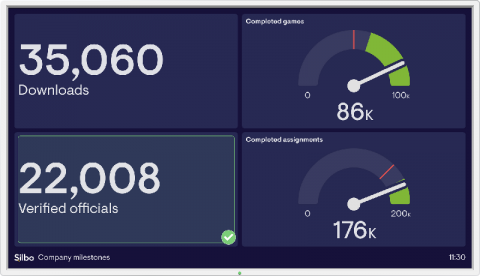Teams | Collaboration | Customer Service | Project Management
Customer Support
5 dashboard examples with very different approaches for tracking company performance
As your company grows, and departments become more specialized, teams can lose sight of overall performance. A dashboard is a great way to present the “pulse” of your business, and keep your team in the loop. Plus, it saves you from creating reports, which are often overlooked or out of date by the time people read them. But what aspects of company performance should you and your team be tracking?
Geckoboard Demo - Make your most important metrics visible
All eyes on data: introducing the new Geckoboard
We’ve redesigned our dashboards, and added a grouping feature to make our TV dashboards the simplest, clearest way to share key numbers with your team. Oh, and we’ve rebranded too.
How to use dashboards to create data-driven legal teams
Is anyone not sold on the benefits of becoming more data-driven? Data brings a wealth of benefits, enabling a world where intuition, gut-feel and conjecture give way to hypotheses validated by concrete information. But even if data is the new oil, finding an effective way of extracting it is easier said than done – just like oil, it’s liable to spills, hard to refine and difficult to manage.
Setting business goals: the ultimate guide
Goals are crucial for team performance and satisfaction at work. They’re also the building blocks for your business’ vision, and help your team translate that vision into reality. But setting the right goals is a fine art, and if you’re not careful it can cause more harm than good. To help you get it right, here’s a curated list of goal setting resources.
How TV dashboards can help your team achieve goals
You and your team want to make the company vision a reality. To do this, you of course need a well-defined strategy. But you also need to make that strategy crystal clear for the whole company. And your team needs to feel excited by it, pull in the same direction, and have the power to take consistent action. While most companies already aspire to work like this, it’s hard to achieve in practice. Here are some of the challenges you may be up against.
How to stop micromanaging and give your team autonomy
To stop micromanaging, and give your team more autonomy, you could just follow the advice of William McKnight, the founder and one-time president of 3M: “Hire good people and leave them alone.” Unfortunately, it’s not quite so easy in practice, so in this article we’ll cover...
What is a key performance indicator (KPI)?
A KPI is a numeric measure of performance for any activity that’s important to your business. Sometimes known as a ‘performance measure,’ the term KPI is often used interchangeably with ‘metric.’ The only real difference between the two is the word ‘key.’ KPIs are important metrics that you really care about, but a metric is any number that you track.
How to set meaningful and effective KPIs
Aside from an office dog, KPIs might just be the best thing you introduce to your company. After all, they give you the power to measure performance and ultimately improve. But, like an office dog, KPIs should be chosen carefully. Otherwise they can distract teams, damage morale, and generally cause chaos. To help you avoid the pitfalls and get the most from KPIs, here are some tips for setting them.







